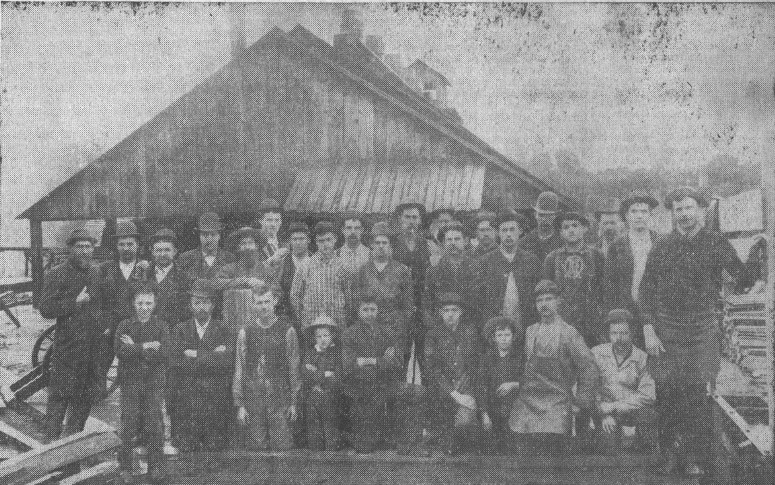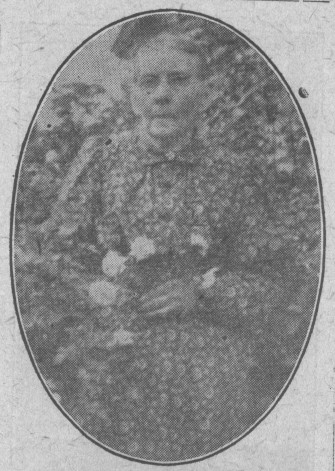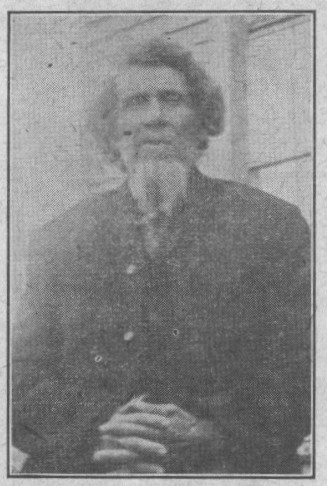
|
When Larabee Was Lumber Center
For Area
|
 |
| When the above picture was taken at Larabee, it was a thriving
lumber center. One of the larger sawmills that dotted the Allegheny
River was operated there by Newman and Dunbar. J.A. Sampson and
Company had a general supply store and operated a number of small
portable sawmills in that vicinity. There were two hotels near the
depot, Chadwick Hotel and the Larabee House, the former operated
by E.V. Chadwick, former sheriff of McKean County and a membe of
the famouse Bucktail Regiment of the Civil War. Ransom Larabee was the other proprietor. M.G. Lear had a general store and post office. When the railroad was extended from Clermont to Johnsonburg, Larabee became an important junction point on the Western New York and Pennsylvania Railroad, now the Pennsylvania Railroad Company. The mill shown in the picture above was destroyed by fire in 1889 and never rebuilt. That fire also destroyed Sampson and Company's store, marking the beginning of the end for that lumber center. When the mill burned, the Olean Fire Department took a steamer over the railroad to Larabee to assist the local fire fighters but the combined forces were unable to halt the fire. |
|
HISTORY OF LARABEE
Interesting Account of Early Settlement, Lumber Activities, Etc. By Jessie E. Carpenter, 1924 |
|
In 1811 Jacob Stull, enroute from Jersey Shore, to
find a location in the forests of this region, reached a point
near the "Old Rollway," at the southern end of town.
The shades of evening were falling, so he made camp near the river,
where he spent the night in unbroken slumber. The next morning
he awoke refreshed, to greet the smiling sun. After wandering
through the surrounding forest for a little time, he thought the
place so beautiful that he decided to locate near the site of
his camp. He built a cabin, cleared some land and lived here for
a time. Later he went down the river, eventually settling in Ohio.
Next Ebenezer Larabee settled on what is known as the Young's
estate. They had a large family of children, one of whom was Ransom
Larabee, from whom this place was later named. Ransom kept a hotel
here for many years, and did much to promote the growth of the
town. Other settlers came from time to time, some staying, other
going farther on. A man by the name of John Tompkins, settled
near where William Peake now lives. He built a log cabin with
a stone fireplace, using large flat stones for the hearth. |
 Mrs. Oscar Carpenter Born in 1827 "The first woman in Larabee to own a cook stove." |
About this time, Jacob Larabee, a brother of Ransom, settled on the farm, later owned by Almon Carpenter, who passed his life in farming and lumbering. S.T. Carpenter settled on the farm north of him and Daniel Childs on the south; while William Windsor bought the farm south of Mr. Childs. Mr. Windsor ran a livery stable for several years, in conjunction with his farming and was also constable and collector for several terms. Later, Waterbury Miller settled on a farm south of him and aside from farming, was for several years a Sunday school worker and exhorter. Later he accepted a charge and became a methodist minister of some note. All these farms had to be hewn from out of forest primeval, a task that the modern soft handed scions of these hardy pioneers would shrink with something akin to horror. It goes without saying, that the womens part in the general plan of existence, was no less strenuous than the mens. Surrounded as they are today by the many modern con-veniences, women kind can hardly comprehend the many duties devolving upon the pioneer woman. In those early days, many Indians roamed up and down the valley, camping on the hillsides and hunting through the forests. Many arrow heads of flint, stone hatchets and pipes have been plowed up from the ground where they camped. Sometime they traveled in droves, the "noble red men" stalking ahead, with their guns, and the squaws bringing up the rear with their duffle packs on their backs. Oftimes they stopped at the houses for something to eat, or a drink of buttermilk or sour milk, of which they were very fond. One old Indian, "Copperhead" by name, with his squaw, used to often stop at my fathers house for free refreshments. He was a large strong man, she small and delicately formed. |
The last time they were there, she seemed quite feeble, but had to carry the pack just the same. Sometime later he returned alone. After a drink of buttermilk he announced "squaw dead" and my mother said that's too bad you must miss her very much, "Huh!, Me no care! Me git another!," he said. Another Indian traveled alone, and ate many meals among his white brothers. One day two neigh-boring boys came upon his camp in the woods and he asked them to eat with him. he went to the fire, raked off the coals, and pulled out a woodchuck, all roasted a la natural. Putting it on a log he slit it open with his knife and filling his mouth with the innards said, "Come on Norm! Come on Gates!" The young boys took a bee line for home but never wearied of telling the storey, with man embellishments. Game was very plentiful in those days and the much prized venison of today was a common article of diet. There were trout in the creeks and pike, suckers and smaller varieties of fish in the river. Spearing a 20 lb pike caused no excitement in those days. Every man owned a gun and knew how to use it. Hunting stories were told whenever men got together. Baker Stull used to tell of the time when their meat supply got low and he came onto the Larabee flats for a deer. It was late spring and the mosquitos so thick that he wore a silk handkerchief tied over his face below his eyes and his hands covered. He went but a short distance when a big deer bounded from a thicket. He aimed his gun and the deer fell dead with a bullet through its head. When he reached the spot where the deer lay, it was so covered with mosquitos that he hardly recog-nized it. |
 Gates Lamphere, a pioneer resident of Larabee and one of the boys asked by the Indian to eat woodchuck with him. |
When a boy he was hunting cows in the woods, when a large bear reared up in the path before him. Being unarmed he was so frightened that he did nothing but took the bear in the eyes, until with a loud "woof' the bear turned and trotted away. After a while people ccame from distant towns, bringing hounds to hunt the deer. Of course the farmers resented it, and slyly killed every hound they could. One of the prominent farmers was fixing his fence in the woods when he heard a hound coming down the hill in pursuit of a deer. He grabbed a handy club and running to the runway waited for the deer to pass, and the dog to come in sight. Just as he raised the club to strike, another farmer a few trees up the trail, shot the dog through the heart. Another time a hound was shot from between its owners legs by a farmer concealed on the opposite bank of the river. Partridges and squirrels were everywhere and large flocks of wild ducks fed along the river. In the springtime when the pigeons were nesting, many thousands of them were snared in nets, during their morning flights, on their way to their feeding grounds, and taken down the river in boats, and sold for city consumption. The men used stool pigeons to lure them down to the nets, in flocks, and before they realized it, the nets were sprung and pigeons caught. The first general store in Larabee was for several years, conducted by D.F. Carpenter at the upper end of town. In 1873, he moved to Michigan and Jabez Rice succeeded him in the business. With the advent of the railroad in 1872, and the building of a station here, the town began to grow. Ransom Larabee and Charles Moore, each built a large hotel across from the rail station, and Hyde Rice erected a building between the two, in which he held the Post Office. Oscar Carpenter built a building in which he held his justice office on the second floor and rented the lower floor to Thomas James for a butcher shop. W.H. Hudson and Charles Lamb had a grocery and drug store, together with a shoe shop, near the crossing. Mrs. Hudson also did a thriving business in the millinery line. George Sheldon conducted a general store at the southern end of town. He was succeeded by D.C. Young. Later J.J. Newman built a large saw mill close by the river bridge, together with a large boarding house and Sampson and French ran a general store nearby. New houses were built and many families moved in and soon it was a thriving little town. When the timber was nearly cut from the hills, the mill, together with the boarding house and store, burned. Ensign Skinner, the town oracle and joker, gave this version of the conflagration. "He was night watch man at the mill the winter before, and the weather was exceedingly cold. One night it was so cold that he had to keep the fires going full blast to keep everything from freezing. He worked so hard, that he sat down to rest, and went to sleep. When he awoke he began to shiver and soon got warm enough to walk over to the fire. It seemed to be burning but the flames looked pale and still. He tried to poke up the fire and found the flames frozen hard but he knocked them off and getting some kindling soon had a good fire going. Then he took the broom and swept the frozen flames out onto the pile of saw dust and shavings outside." In Spring the mill burned and he was absolutely certain, that when those flames thawed out, they set fire to the mill. With the passing of the mill, the mill workers sought other fields of work. During these intervening years, their houses have either burned, been torn down, or moved away. Hotels and business places burned, until at the present time there are very few inf any more inhabitants here than when the first railroad survey was made through the valley. All of these old people have passed on to a brighter better shore; but upon our hillsides, they have put their impress, which even time can not wholly obliterate; and their memory still remains with us like a benediction from the past. |